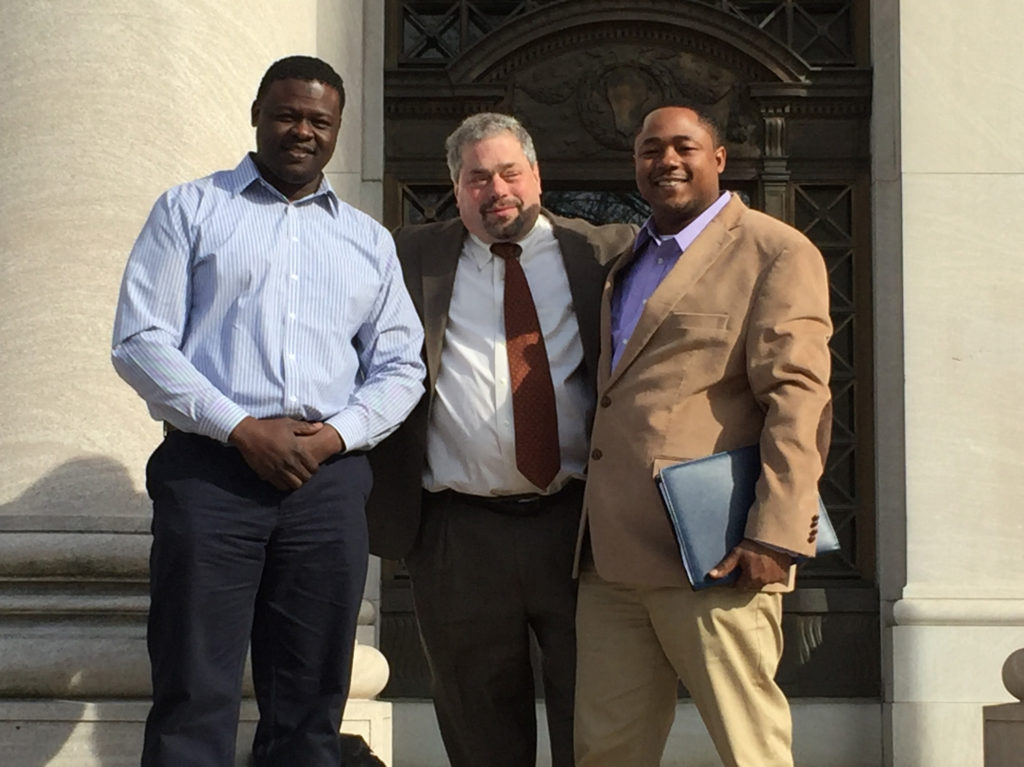Yosif Bakhit Recognized As Courageous Plaintiff At National Employment Lawyers Conference

Be The Change
National Employment Lawyers Association
2017 Annual Convention
June 21–24, 2017
Marriott San Antonio Rivercenter, San Antonio, Texas
Yosif Bakhit was a black Muslim Sudanese immigrant who was granted political asylum in the United States after he fled his native country, Sudan. Bakhit was a high school student who had been arrested and beaten several times as a result of his political opposition to the ongoing civil war in the Sudan. He came to the United States in 2000. When he came to the United States, he spoke very little English and had no money. He was homeless for a period of time. He got a job, learned English and ended up in Bridgeport Connecticut. Yosif became a United States citizen in 2011.
In 2008, Yosif got a job at Safety Marking, a company that painted traffic lines on the highways. Nearly all of Safety Marking’s business was through contracts with federal, state, and local governments and governmental authorities. Safety Marking was subject state and local fair wage and affirmative action criteria. Mr. Bakhit was sending the money that he earned at Safety Marking back to his family in Sudan. In addition to supporting his parents, he paid for his two younger sisters to attend and graduate from college.
From 2009 – 2012, Yosif Bakhit suffered severe and pervasive racism at Safety Marking. Most of this was perpetrated by his supervisors. He was referred to as an ape or gorilla, offered bananas, was compared to a black doll, and overheard a white manager shout the “white power” in the workplace. Another supervisor made a lynching reference in connection with a black employee who was accidentally dragged by a truck. Employees and supervisors frequently used the “n-word” in Bakhit’s presence. Arab workers were referred to as “terrorists” and “camel jockeys.”
In 2012, Bakhit’ s younger brother ran for Sudan in the Olympics, and Bakhit showed a picture of his brother standing with Usain Bolt, the Jamaican runner who has won four gold medals. About two weeks later, his supervisor sent a text to Bakhit of a photograph of Usain Bolt chasing a young white girl carrying a piece of fried chicken.
Bakhit complained several times, and his complaints were ignored. In 2012, he retained counsel, and requested that the company investigate his allegations. The company never interviewed Bakhit before it responded denying the allegations, and offered no specific remedial action.
Mr. Bakhit was a simple person and a hard worker with good values, an infectious smile, an innate trust in people. Since he grew up in another country and was unfamiliar with our culture, Bakhit often did not initially know that his supervisors and co-workers were making fun of him in despicable ways. His sense of betrayal was devastating. Bakhit was also quite fearful of many of his harassers. Some of them were known by him to have been violent, and one bragged about his affiliation with Hell’s Angels. His car window was broken shortly after he had lodged his formal complaint.
Another African-American co-worker, Kiyada Miles also came forward, initially as a witness, and later as a co-plaintiff. Miles had also observed and experienced severe racist comments and behavior in the workplace. Miles came forward, despite the risk, because he was outraged and disgusted by what had happened to his friend. Another white co-worker, a retired police detective, also came forward as a witness for Mr. Bakhit. Numerous other individuals who had witnessed or experienced racist and abusive behavior refused to testify due to their fear of the defendants.
From 2008 – 2012, neither Bakhit nor Miles were promoted or received raises, while many of their white co-workers advanced. Bakhit and Miles were the only two black laborers at Safety Marking during that time period. The differential treatment between the plaintiffs and the white workers and the standards applied to them were made very obvious at trial.
Bakhit and Miles brought hostile environment and discrimination claims under 42 U.S.C. 1981 against Safety Marking and five individual defendants in federal court. The litigation was total war, with the defendants contesting every issue and denying every allegation.
The trial lasted over two weeks. On Thursday, March 24, 2016 the jury found for both Bakhit and Miles on both the discrimination and hostile environment claims, awarding Bakhit $305,000 and Miles $86,000. In a bifurcated hearing on punitive damages the following day, the jury both individual plaintiffs $1.5 million each. The total verdict was approximately $3.4 million, exclusive of attorney’s fees and costs. This was the largest jury verdict for individual plaintiffs in a race discrimination in Connecticut in either state or federal court. Attorney’s fees and costs were approximately $1,000,000.
The jury was all white. The verdict on behalf of a black Muslim immigrant came on the same day that the media reported that two presidential candidates (Trump and Cruz) were exploiting fear and prejudice by advocating patrolling Muslim neighborhoods in this country. The verdict sent a strong message that our federal courts are open and provide a fair hearing to everybody, and that Connecticut will not Jim Crow style racism.
The case did effect change. State and local EEO organizations commenced investigations on Safety Marking and imposed sanctions on them for their civil rights violations. The verdict was reported nationally and internationally. In particular, a number of trade journals in the construction industry published the verdict as a cautionary tale. Hopefully companies in the industry will take their EEO and affirmative action obligations more seriously. Safety Marking has tightened its anti-harassment policy, and at least one supervisor has subsequently been discharged for making racially inappropriate remarks.
